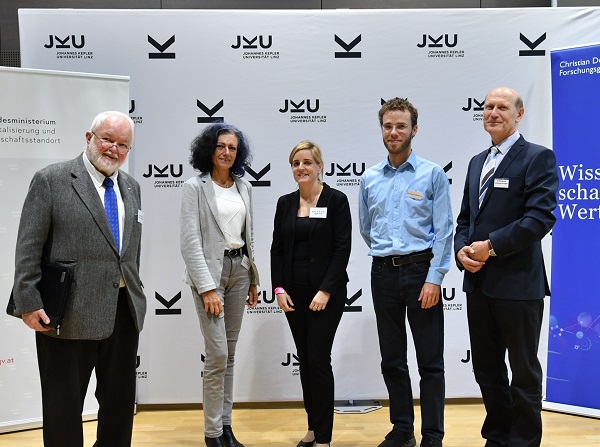Researchers at a new JKU CD lab aim to conduct research on smart soft plastic materials in support of a new generation of shock absorbers.

Shock absorption is a key part of our lives, be it in our own bodies, bicycles, and cars. Not all materials, however, are capable of shock absorption. Researchers at the new "Christian Doppler Lab Laboratory for Soft Structures in support of Vibration Isolation and Shock Absorption" will be working on smart, adaptive shock absorbers for the future. Endowed with € 1.2 million in funding, the Lab will be funded to 2027.
Funded by the Austrian Federal Ministry for Digital and Economic Affairs (BMDW), Christian Doppler Laboratories bring renowned scientists together with innovative companies and provide the infrastructure needed to conduct high quality, base-knowledge research.
Dr. Margarete Schramböck, Austrian Federal Minister for Digital and Economic Affairs, remarked: "We encounter some type of shock absorbers on a daily basis. They help protect people, buildings, machines, equipment, and vehicles from being damaged. Together with the business community, we are providing the new CD Lab with € 1.2 million in funding in an effort to support innovative concepts and ideas in this area."
Lab Director Assoz.Prof. Ingrid Graz explained: "Shock absorption plays a key role in our lives, beginning with our own bodies in which bones - but also skin, muscles and fat - absorb shocks - to cars. Shock absorbers are an important part of a vehicle suspension system and help us move forward more smoothly. We aim to work together with our industrial partners at the CD Lab to explore and develop soft materials to create active, meaning adjustable, shock absorbers containing integrated sensors." Based at the School of Education and in cooperation with DMH Dichtungs- und Maschinenhandel GmbH and AVL List GmbH, Prof. Graz will be focusing on innovative approaches to support adjustable shock absorbing elements made out of elastomers (soft plastics) that can provide better protection against damage caused by shocks or vibrations.
DI Dr. Umut Cakmak (Institute of Polymer Product Engineering at the JKU), added: "Soft materials, such as elastomers, will serve as the starting point as they are characterized by their inherent shock absorption properties. These are first characterized, then modified, and then used to develop shock absorbing structures."
The new generation of shock absorbers can be found in vehicles, machines, and buildings.
"Christian Doppler Laboratories stand for what the JKU is also all about," said Alberta Bonanni, JKU Vice-Rector for Research. "This means close cooperation between business and academia in support of academic research and then ultimately applied practice. I am very excited about the work that will be done at this particular CD Lab and I would like to wish Prof. Graz and her partners a successful start."
Philip and Andreas Hochfellner, managing directors at DMH, added: "You can never stand still when it comes to progress: this is why we here at DMH have always been open and appreciative for opportunities and collaboration with experts in academia as well as in our industry. We look forward to exciting new ideas, especially in regard to new product development, for example."
DI Valerio Siciliano, AVL List GmbH, points out: "Our collaboration with the new JKU CD Laboratory will provide us with new approaches in support of adjustable mechanical properties for vehicle elastic fasteners. This means that depending on the current driving situation, the components can dynamically adjust to properties in the direction the vehicle is driving and better support the level of comfort."
Christian Doppler Laboratories support high quality, base-knowledge and application-oriented research by bringing top researchers and scientists together with representatives from innovative companies. The Christian Doppler Research Association is internationally regarded as a best practice example to support this kind of partnership. Joint funding for Christian Doppler Laboratories stem from the public sector and participating companies. The Austrian Federal Ministry for Digital and Economic Affairs (BMDW) is most important public funding agency.








